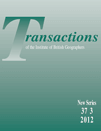
TRANSACTIONS OF THE INSTITUTE OF BRITISH GEOGRAPHERS
Scope & Guideline
Innovating Insights into Spatial Dynamics
Introduction
Aims and Scopes
- Interdisciplinary Approaches to Geography:
TIBG publishes research that transcends traditional geographic boundaries, integrating insights from sociology, anthropology, environmental science, and political economy to provide a holistic understanding of spatial phenomena. - Critical Examination of Power Dynamics:
The journal emphasizes the exploration of power relations in geographical contexts, including colonial legacies, socio-economic inequalities, and the politics of space, encouraging critical engagement with contemporary issues. - Focus on Environmental Change and Sustainability:
With a significant emphasis on climate change, biodiversity, and environmental justice, TIBG addresses pressing global challenges, promoting research that informs sustainable practices and policies. - Innovative Mapping and Spatial Analysis:
The journal encourages the use of innovative mapping techniques and spatial analysis to visualize complex geographical data, contributing to a deeper understanding of spatial relationships and dynamics. - Social Justice and Equity:
TIBG prioritizes research that highlights social justice, equity, and the experiences of marginalized communities, fostering discussions around inclusivity and representation in geographic research.
Trending and Emerging
- Climate Change and Environmental Justice:
Recent publications increasingly focus on the implications of climate change, emphasizing environmental justice, resilience, and adaptation strategies in both urban and rural contexts. - Digital Geographies and Data Politics:
The rise of digital technologies and their impact on geography is a prominent theme, with research exploring data politics, digital mapping, and the implications of smart city initiatives. - Geographies of Race and Identity:
Emerging scholarship on race, identity, and decolonization is gaining traction, with a focus on how geographic spaces shape and are shaped by racial and cultural dynamics. - More-than-Human Geographies:
There is a growing interest in more-than-human perspectives, exploring the interconnectedness of human and non-human actors in shaping geographical spaces and environmental governance. - Health and Wellbeing in Geography:
Research on health geographies, particularly in the context of the COVID-19 pandemic, is increasingly relevant, examining spatial inequalities in health access and the socio-spatial implications of health crises.
Declining or Waning
- Traditional Economic Geography:
Research focused on conventional economic geography, such as industrial location theories and traditional economic models, appears to be less prevalent in recent issues, suggesting a shift towards more dynamic and interdisciplinary approaches. - Static Geographical Models:
There is a noticeable decline in the publication of papers relying on static models of geography. Instead, the journal has embraced more fluid and adaptable frameworks that respond to contemporary challenges and complexities. - Historical Geographic Studies:
Studies solely focused on historical geography without contemporary relevance are becoming less common, as the journal favors research that connects past geographies to current socio-political contexts.
Similar Journals
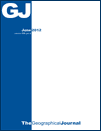
GEOGRAPHICAL JOURNAL
Elevating the discourse in geography and environmental studies.Geographical Journal, published by Wiley, is a leading scholarly resource dedicated to advancing the field of geography and earth-surface processes. With an established history dating back to 1973, this prestigious journal thrives on disseminating high-quality research, featuring a robust archive that encompasses critical insights from various geographical and environmental studies. As evidenced by its impressive Q1 rankings in both Earth-Surface Processes and Geography, Planning and Development, the journal stands out in its commitment to impact and relevance in the academic community. Although not Open Access, the journal provides researchers, professionals, and students with invaluable peer-reviewed articles essential for understanding complex geographical phenomena. Whether you are focused on socio-environmental interactions or earth sustainability, Geographical Journal serves as a cornerstone for innovative research, fostering knowledge that shapes policy and practice.
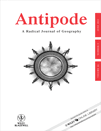
ANTIPODE
Exploring the Nexus of Society and EnvironmentANTIPODE is a leading academic journal published by WILEY, renowned for its contributions to the fields of Earth-Surface Processes and Geography, Planning, and Development. With an impressive impact factor and ranked in the Q1 category for both Earth and Planetary Sciences and Social Sciences, it is a pivotal resource for researchers and professionals who seek to explore the complex interplay between social and environmental dynamics. Since its inception in 1969, ANTIPODE has provided a platform for innovative and critical scholarship, fostering discussions that drive forward-thinking research in its domain. The journal's rich history continues into 2024, as it remains committed to publishing high-quality, peer-reviewed articles that challenge norms and inspire further research. Researchers, professionals, and students will find in ANTIPODE not only a journal but a community dedicated to advancing knowledge and practice in geography and development studies.

Journal of Spatial Information Science
Connecting Ideas, Mapping FuturesThe Journal of Spatial Information Science is a premier open-access journal published by the University of Maine, dedicated to advancing research in the interdisciplinary fields of spatial information science, geography, and computer science. With an ISSN of 1948-660X, this journal has established itself as a significant contributor to the academic community since its inception in 2010, achieving notable rankings as evidenced by its classification in the Q2 quartile across multiple categories, including Computers in Earth Sciences and Geography. The journal offers a platform for innovative research, fostering collaboration and knowledge dissemination among researchers and practitioners. Its impact is further underscored by its Scopus rankings, placing it in the top percentiles across critical disciplines. With Open Access options available, the Journal of Spatial Information Science ensures that high-quality research is accessible to a broader audience, promoting the ongoing development of the field through thoughtful and rigorous academic inquiry.
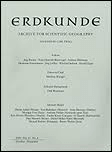
Erdkunde
Bridging Theory and Application in Environmental StudiesErdkunde is a pivotal academic journal published by the Geographisches Institut, University of Bonn, dedicated to the fields of Geography, Earth and Planetary Sciences, and Ecology. With a history dating back to 1976, this journal serves as a platform for interdisciplinary research and discourse, reflecting diverse perspectives from both theoretical and applied dimensions within these domains. Published in Germany, it currently holds a respectable position within the academic community, classified in Q2 for Geography, Planning and Development and Q3 in Ecology and Earth and Planetary Sciences. Although not an open-access journal, its contribution is significant, offering insights that advance our understanding of spatial dynamics and environmental processes. With Scopus rankings that place it within the median range, Erdkunde is an essential resource for researchers, professionals, and students looking to deepen their knowledge and engage with contemporary trends in geographic research.
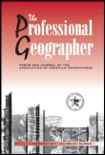
PROFESSIONAL GEOGRAPHER
Elevating the Discourse in Geography and Earth SciencesPROFESSIONAL GEOGRAPHER is a prominent journal in the fields of geography and earth-surface processes, published by Routledge Journals, Taylor & Francis Ltd. With a rich history dating back to 1949 and continuing through 2024, it serves as a vital platform for researchers, professionals, and students to explore and disseminate groundbreaking research and insights within the geographical sciences. The journal holds a respectable impact factor, placing it in the Q2 quartile for both Earth-Surface Processes and Geography, Planning and Development as of 2023, highlighting its importance in these critical academic areas. The journal ranks #273 out of 821 in Geography and Planning and #70 out of 179 in Earth and Planetary Sciences on Scopus, reflecting its robust contribution to advancing knowledge in social sciences. Although it does not currently offer open access options, it still provides invaluable content that influences pedagogy and research in geography. Its comprehensive scope invites a wide range of geospatial topics, encouraging interdisciplinary dialogue and collaboration across the global academic community.
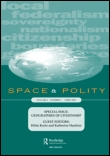
SPACE AND POLITY
Advancing Insights into Spatial PoliticsSPACE AND POLITY is a renowned journal published by Routledge Journals, Taylor & Francis Ltd, focusing on the interdisciplinary study of spatial dynamics and governance processes from both geographical and political perspectives. With an ISSN of 1356-2576 and E-ISSN of 1470-1235, it has established a significant academic presence since its inception in 1997. The journal has maintained a strong impact factor, achieving a Q2 ranking in Geography, Planning and Development and a prestigious Q1 ranking in Political Science and International Relations as of 2023. It is recognized for its contributions to the understanding of spatial politics and the interplay between space and governance, making it an invaluable resource for researchers, professionals, and students alike. Though not an open-access journal, it is accessible through numerous academic databases, ensuring that its cutting-edge research reaches a wide audience. The journal's continuing evolution, with a converged timeline extending to 2024, reflects its commitment to advancing knowledge in these vital areas of study, highlighting the importance of spatial factors in political and social contexts.
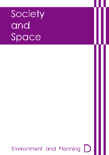
ENVIRONMENT AND PLANNING D-SOCIETY & SPACE
Uncovering the complexities of spatial dynamics in a changing world.Environment and Planning D: Society & Space is a prestigious journal published by SAGE Publications Ltd, focusing on the interdisciplinary intersection of environmental studies, urban planning, and social sciences. Since its inception in 1983, this journal has become a leading platform for groundbreaking research, evident by its distinguished Q1 rankings in both Environmental Science and Geography, Planning and Development categories. With an impressive Scopus rank placing it in the top 10% of related fields, it provides an invaluable resource for researchers, policymakers, and practitioners alike. The journal features high-quality articles that delve into contemporary issues like climate change, urban sustainability, and spatial dynamics, fostering a critical understanding of the socio-environmental challenges of our time. Although currently not offering open access, Environment and Planning D remains committed to advancing knowledge and inspiring innovative solutions for a sustainable future, drawing contributions from experts around the globe.

Letters in Spatial and Resource Sciences
Connecting Research and Practice in Resource AllocationLetters in Spatial and Resource Sciences, published by Springer Heidelberg, is a prestigious journal dedicated to the interdisciplinary exploration of spatial and resource-related issues within the fields of demography, economics, geography, planning, and urban studies. Since its inception in 2008, this journal has provided a platform for cutting-edge research, facilitating the exchange of innovative ideas and methodologies that address contemporary challenges in spatial dynamics and resource allocation. With an impact factor reflecting its robust standing in academic circles (notably ranking Q2 in Demography and Geography, and Q3 in Economics and Econometrics as of 2023), it serves as an essential resource for scholars and practitioners alike. The journal is committed to fostering open dialogue and advancing the understanding of spatial phenomena, making it a vital asset for anyone engaged in these dynamic areas of study. Targeting a diverse audience, from researchers to industry professionals, it aims to enhance scholarly communication and promote evidence-based solutions to spatial and resource dilemmas.
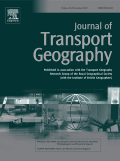
Journal of Transport Geography
Charting New Paths in Transport GeographyThe Journal of Transport Geography, published by Elsevier Ltd, stands as a premier international platform for the dissemination of research at the intersection of transportation and geography. Established in 1993, this journal explores critical issues in transport systems, spatial analysis, and environmental impacts, providing invaluable insights for academics, policymakers, and industry practitioners. With an impressive impact factor and ranking within the top quartiles across multiple categories including Environmental Science and Geography, Planning and Development, the journal is recognized for its rigorous peer-review process and high-quality contributions. As it converges towards the target year of 2024, the Journal of Transport Geography continues to serve as an essential resource for understanding the challenges and innovations shaping transportation landscapes globally. Access to its research is available through traditional subscription models, reinforcing its commitment to supporting the advancement of knowledge in this vital field.
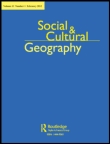
SOCIAL & CULTURAL GEOGRAPHY
Advancing interdisciplinary dialogues in cultural landscapes.SOCIAL & CULTURAL GEOGRAPHY, published by Routledge Journals, Taylor & Francis Ltd, stands as a leading platform for innovative research in the fields of cultural studies and geography. With an impressive impact factor reflected in its Q1 ranking in both Cultural Studies and Geography, Planning and Development categories, this journal houses high-quality articles and theoretical frameworks that shape contemporary discussions in social and cultural geography. Its rigorous indexing, including a commendable Scopus Rank—#20 out of 1304 in Cultural Studies—underscores its significance and influence in the academic community. Operating since 2000 and continuing to thrive until 2024, SOCIAL & CULTURAL GEOGRAPHY promotes interdisciplinary dialogues while fostering a deeper understanding of the intricate relationships between society and space. We encourage researchers, professionals, and students to engage with resourceful insights and critical perspectives published in this pivotal journal, thereby contributing to the evolving landscape of geographical thought.